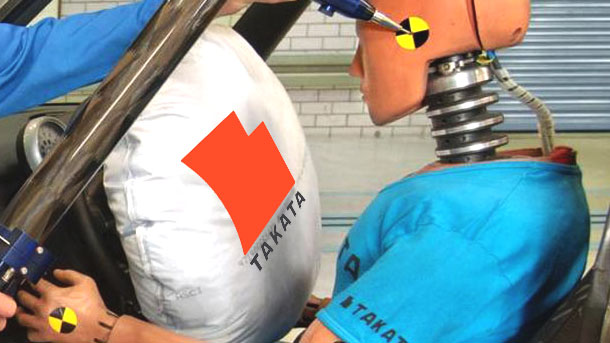
WASHINGTON — Under pressure from U.S. regulators, Japanese airbag manufacturer Takata Corp. is expected to announce as early as Wednesday that it is recalling 35 million to 40 million additional inflators in U.S. vehicles, according to several media reports today.
Reuters attributed the information to three sources briefed on the matter. The Wall Street Journal and Nikkei posted similar reports.
The expanded recall will be phased in over several years and more than double what is already the largest and most complex auto safety recall in U.S. history. The new recall will cover all frontal airbag inflators without a drying agent, sources briefed on the matter told Reuters.
Plans for the expanded callback come after the National Highway Traffic Safety Administration reviewed findings from three outside investigations — by the 10-automaker Independent Testing Coalition, Honda and Takata — into the defective airbag inflators.
The inflators contain propellant that can deploy with too much force and rupture its metal container, spraying vehicle occupants with metal shards. The defect has been linked to 10 deaths in the U.S. and more than 100 injuries.
Consent order
In November, Takata entered into a consent order with NHTSA that gave the regulator broad authority to order additional recalls. The agreement also requires Takata to recall all inflators using ammonium nitrate propellant unless they prove by 2019 that the compound is safe.
Some 85 million unrecalled Takata inflators use ammonium nitrate, NHTSA has said.
A NHTSA spokesman declined to comment on reports of the latest expansion of the callbacks.
“The recall of Takata airbag inflators covered by the NHTSA Consent Order continues and the agency will take all appropriate actions to make sure air bags in Americans’ vehicles are safe,” the spokesman said.
Recalls to date
To date, 14 automakers, led by Honda Motor Co., have recalled 24 million U.S. vehicles with 28.8 million inflators due to the risk that they can explode with too much force and spray metal shards inside vehicles.
The new recall is expected to include about 35 million passenger-side airbags and some driver-side airbags without a drying agent. It is also expected to include some airbags that were previously replaced that did not have a drying agent.
Last month, NHTSA said there were about 85 million unrecalled Takata airbag inflators in U.S. vehicles that would need to be recalled by 2019 unless the company can prove they are safe.
The recall expansion leaves open the question of whether about 50 million inflators — including 18 million side inflators and about 32 million frontal and side airbags with drying agents — will eventually need to be recalled.
The prospect of ballooning recall costs has prompted Takata to look for a financial backer.
[vc_btn title=”More on Takata Recall” style=”outline” color=”primary” size=”lg” align=”left” link=”url:http%3A%2F%2Fwww.autonews.com%2Farticle%2F20160503%2FOEM11%2F160509961%2Ftakata-poised-to-recall-another-35-40-million-u-s-airbag-inflators%3Futm_source%3Dnatlnewsletter%26utm_medium%3Demail%26utm_content%3Dnational%26utm_campaign%3DMiami_20160504_0846|title:More%20on%20Takata%20Recall|target:%20_blank”][vc_message message_box_style=”3d” message_box_color=”turquoise”]By Reuters, SouthFloridaReporter.com, May 4, 2016
Ryan Beene & Automotive News contributed to this report[/vc_message][vc_message message_box_color=”green”]Previous Stories[/vc_message]












